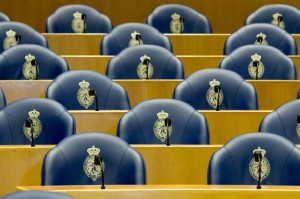Dutch Parliament, Plasterk Emphasise Need For Fair Curaçao Elections
Dutch Parliament, Plasterk Emphasise Need For Fair Curaçao Elections
 THE HAGUE – The Second Chamber of the Dutch Parliament and Minister of Home Affairs and Kingdom Relations Ronald Plasterk, during a plenary debate on Thursday, reaffirmed the importance of having the elections proceed in Curaçao and that these elections take place in a free, fair manner without interference or pressure.
THE HAGUE – The Second Chamber of the Dutch Parliament and Minister of Home Affairs and Kingdom Relations Ronald Plasterk, during a plenary debate on Thursday, reaffirmed the importance of having the elections proceed in Curaçao and that these elections take place in a free, fair manner without interference or pressure.
“In no way can there be interference in the process of free election. Attempts to do so would be a violation of the rule of law,” Plasterk stated. He reiterated his earlier statement that the April 28 elections had been called in a lawful manner.
Plasterk again expressed support for the decision of the Curaçao Governor to ratify the National Decree of the former Curaçao Government to dissolve the Parliament and to call new elections.
“The National Decree was signed by the Governor which has effectuated the process of elections. There can be no misunderstanding about that.” Plasterk confirmed that today, Friday, there would be a meeting of the Kingdom Council of Ministers, but he reminded the Parliament that the agenda was confidential.
The support for the Governor was voiced by a majority in the Second Chamber. “I am very proud of what the Governor has done. She has clearly indicated that the elections must proceed,” said André Bosman of the liberal democratic VVD party. Ronald van Raak of the Socialist Party (SP) voiced similar sentiments and expressed appreciation for the Governor.
Both Van Raak and Bosman lauded the active role of the social partners in Curaçao in support of the April 28 elections. “I see a community assuming a more activist role, and the church indicating its support. The awareness is growing and I am very proud of that. The people are making clear that it is time for elections, that their voice must be heard and that politics should not mess with the elections,” said Bosman.
Van Raak said he was very appreciative of the Curaçao people taking their protest to the streets, and the unions, churches and organisations, “because they don’t want Curaçao to again become a mafia state.”
Bosman mentioned ship jumping. “The Koeiman government didn’t fall because of a break-up between the coalition partners, but because of ship jumpers. Those are people who consider their own interest more important that the interest of the nation. Based on which ideological grounds did these people moved over to the camp of Gerrit Schotte? I cannot think of any other ideology than the wallet.” Bosman referred to Schotte as a “convicted, corrupt money launderer who always placed his own interest above that of Curaçao.”
Van Raak was also highly critical of the Schotte-backed new interim government. A “puppet government of the underworld,” he called it. He accused the government of trying to pressure and intimidate civil servants and journalists. “A culture of intimidation has been created by Schotte, by the underworld. Some people are afraid.”
Van Raak mentioned that vote-buying took place on a large scale during the last elections. “Sometimes the temptation of money is too big. At least then you know you have something.” He asked Minister Plasterk whether there was a role for the Kingdom Government to “ensure that the elections took place in an orderly fashion.”
Bosman also contended that there was a role for the Kingdom Government, despite the fact that the elections were an autonomous, national matter. “However, it becomes a matter of the Kingdom when the guaranteeing of good governance is in jeopardy. Therefore, it is of great importance that we all closely monitor what happens,” said Bosman.
Sjoerd Sjoerdsma of the Democratic Party D66 said it was “highly important” that the elections took place on the level of internationally acceptable standards. “People have to be able to vote for whom they want to vote without being fearful of the choice that they make,” he said.
Sjoerdsma asked the Minister about having international observers at the April 28 elections. He suggested the Organisation for Security and Co-operation in Europe (OSCE) which is an organisation supported by the countries in Europe, as well as the United States and Canada.
Plasterk announced that former Curaçao Prime Minister Hensley Koeiman has asked for observers. The Dutch Ministry of Foreign Affairs is engaged in talks with international organisations to arrange such; one of these organisations is the OSCE, he said.
The Minister emphasized that the elections were a national matter of the Country Curaçao. “Curaçao is a truly autonomous country when it comes to organising fair elections. I assume that they wish to fulfil this authority in this manner.” He said that the Netherlands was willing to provide support, if requested. If there was a need for ballot boxes, the Netherlands would supply these, he said.
The Daily Herald



Comments
Post a Comment